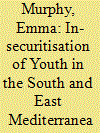| Srl | Item |
| 1 |
ID:
160355


|
|
|
|
|
| Summary/Abstract |
The securitisation of youth as a social category has been well-documented. For the South and East Mediterranean (SEM) countries, moral panics over demographic youth bulges, Islamist radicalisation and protracted conflicts have placed youth centre-stage as a threat to the security of states and societies. Rejecting such assertions as themselves being what Foucault might have termed ‘technologies of power’ in a neoliberal order, and instead taking a critical approach to security, the spotlight is turned towards youth themselves as the referent object of study. This reveals the multidimensional hyper-precarity and insecuritisation of young peoples’ lives which derive from that same neoliberal economic order and the political structures that sustain it in the SEM countries. The finding resonates with other studies of new, insecure, formats for adulthood in Africa and suggests that we should look at the insecurity of young people today to understand global neoliberal futures in countries beyond the post-industrial ‘core’.
|
|
|
|
|
|
|
|
|
|
|
|
|
|
|
|
| 2 |
ID:
190859


|
|
|
|
|
| Summary/Abstract |
Academic perspectives on women in conflict have been consistently moving away from the reductionist narrative of victimhood or deviation from gender norms. Yet, this narrative is still predominant in humanitarian discourses, while it is assumed that women’s participation in peacebuilding derives from their natural proclivities. These narratives, we argue, reinforce the gendered patriarchal post-conflict order as ex-combatant women are pushed into traditional roles through reintegration processes without addressing gendered structural and systemic violence. This article is based on the Colombian case, where a peace agreement in 2016 marked the official end to decades of conflict between FARC-EP rebels and the government. While deep changes were promised, the reality for women ex-combatants has been – despite unprecedented levels of women’s participation – a reordering into traditional roles and a reinforcement of conjugal order rather than a transformative progression towards peacetime emancipation. We argue that, while the government claimed that the economic and political systems were non-negotiable red-lines, there was also another unspoken red-line: that of gender roles. This article argues that addressing the gendered structural roots of conflicts in order to build sustainable peace requires a decisive participation of women, including former rebel combatants whose potential contribution to transformative peacebuilding are often ignored.
|
|
|
|
|
|
|
|
|
|
|
|
|
|
|
|